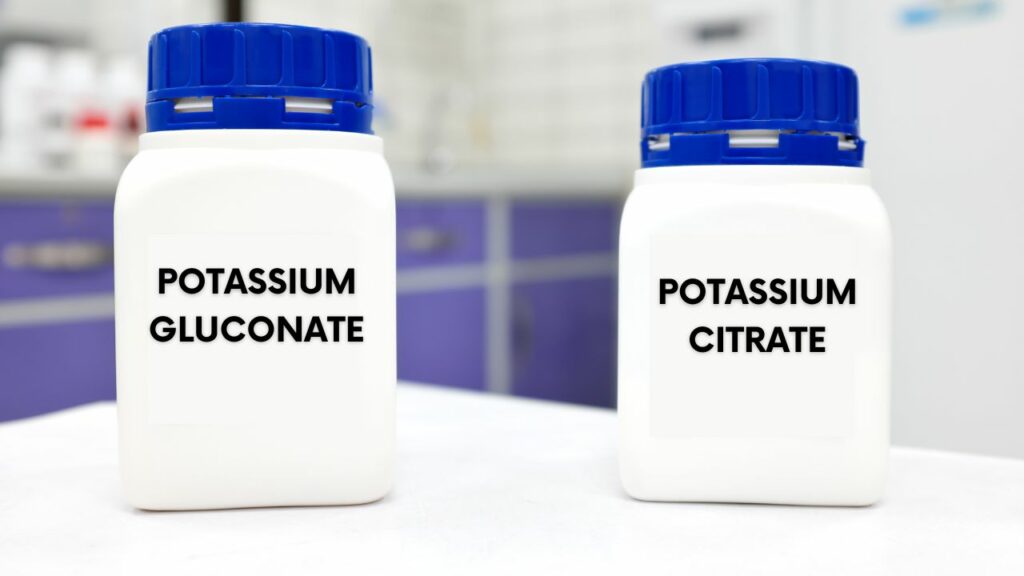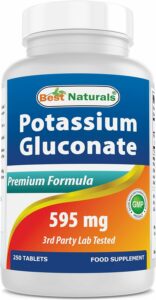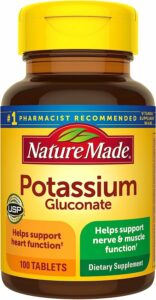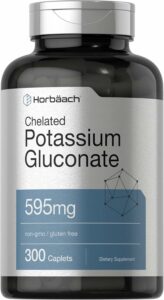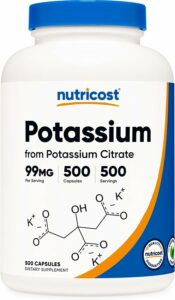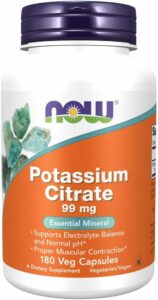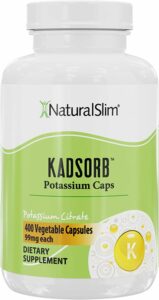One of the most known minerals that we need in the body is potassium. This nutrient serves a myriad of functions to ensure that our bodies work properly.
Potassium can be acquired from natural sources such as food and beverages, but you can also get them as supplements. Certain food products have been fortified and have had potassium added.
Regarding supplements, you may be able to read potassium gluconate and potassium citrate. What’s the difference? Which one is better? Which supplement should you purchase?
Here, we will discuss potassium gluconate vs. potassium citrate and the best supplements that contain either of these minerals.
Table of Contents
What is Potassium?
Potassium is a mineral that is also considered as an electrolyte. This means that potassium helps conduct electrical impulses in the body, regulating functions required to survive.
Examples of these bodily functions that potassium assists in regulating include blood circulation, muscle contractions, transmission of nerve signals, blood pH balance, digestion, and heart rhythm, among others.
A healthy amount of potassium will provide numerous benefits. You will have improved blood pressure, prevent kidney stones, and minimize the risks of strokes, cardiovascular diseases, and even osteoporosis.
Potassium helps immensely in moving much-needed nutrients into the body’s cells and removing unwanted waste products from them.
This nutrient also helps keep sodium levels balanced in the body.
Simply put, potassium is important for good physical well-being as it ensures that all systems required for the individual to survive are functioning normally.
What are Foods Rich in Potassium?
The kidneys are responsible for regulating potassium levels in the body. If there is an excess of this nutrient, then it will be expelled in the form of urine.
Sources rich in potassium include fruits such as bananas, grapefruits, honeydew, apricots, and oranges. Dried fruits such as prunes, dates, and raisins are also rich in this nutrient.
You can also get a decent amount of potassium from foods such as spinach, potatoes, sweet potatoes, mushrooms, cucumbers, pumpkins, broccoli, and other leafy greens.
Those who like fruit juices can also acquire potassium from juices coming from oranges, prunes, apricots, tomatoes, and grapefruits.
Other sources of potassium include nuts, meats and poultry, whole-wheat bread and pasta, different types of beans, dairy like milk and yoghurt, and different types of fish such as tuna, trout, halibut, and cod.
Of course, you can also acquire potassium from supplements. Supplements will typically supply you with potassium using either potassium citrate or potassium gluconate, each with its pros and cons.
What Happens If You are Potassium-Deficient?
A person who has low potassium levels is said to have a condition called hypokalemia. Hypokalemia is caused by excessive loss of potassium, which a number of factors can cause.
These include a lack of potassium intake as well as vomiting, diarrhoea, or excessive use of laxatives. Some diseases, as well as alcohol abuse and excessive sweating or urination, can also cause you to be potassium-deficient.
Hypokalemia can cause different complications that affect the nerves, bones, muscles, and heart. These issues may include irregular heartbeat, constipation, vomiting, excessive thirst and urination, and lightheadedness.
Other complications may include muscle cramping, spasms, numbness, tingling, and general weakness. You can also experience low blood pressure and heart palpitations.
What is the Recommended Dosage of Potassium?
The Harvard T.H. Chan School of Public Health recommends daily doses depending on age and gender. The requirements for pregnant and breastfeeding women would be slightly higher.
Depending on age, women should take anywhere from 2,300 to 2,600 milligrams of potassium daily. Pregnant or breastfeeding women would need about 2,500 to 2,900 milligrams per day.
For men, the recommended potassium dosage is from 3,000 to 3,400 milligrams. Infants to preteens are required about 400 to 2,300 milligrams, depending on age.
A doctor can provide a more specific recommended daily amount based on your specific needs.
What are the Side Effects of Potassium Supplements?
Like with all supplements, there are potential side effects when taking potassium. Some of these side effects include stomach upset, nausea, vomiting, bloating, and diarrhoea.
It is also possible for certain medications, as well as kidney conditions, to affect how the body absorbs potassium. Those with kidney problems can easily have high potassium levels even if they take the recommended dose, for example.
Medications for high blood pressure and certain diuretics can likewise affect the effectiveness of these supplements.
Doctors recommend that you not exceed 3,900 milligrams of potassium per day. You should also speak with a medical professional before taking potassium supplements or any similar product.
Potassium Gluconate vs Potassium Citrate
When choosing potassium supplements, you will have two main choices – potassium gluconate and potassium citrate. What’s the difference?
Potassium citrate is a combination of potassium and citric acid. On the other hand, potassium gluconate combines potassium and gluconic acid.
Both of these compounds can be used to supplement your potassium needs. However, potassium gluconate is much more potent in treating hypokalemia.
Potassium citrate is also mainly used for treating kidney conditions such as kidney stones or a condition called renal tubular acidosis, a disease where there is too much acid in the blood due to kidneys not functioning properly.
Potassium citrate is often used as a food additive to both enhance flavour and regulate the acidity of the food. Potassium gluconate may be used for the latter purpose as well.
Both potassium gluconate and potassium citrate are naturally odourless, have a salty taste, and can come in both powder and liquid form.
Which form of potassium is best for you is recommended. Consult with a doctor to know more about potassium gluconate vs. potassium citrate and which is the better form to consume.
Best Potassium Gluconate Supplements
1. Best Naturals Potassium Gluconate Supplement
Best Naturals Potassium Gluconate Supplement comes in tablet form. Each tablet contains 99 milligrams of potassium in the form of potassium gluconate.
The product is made in the USA and is GMP Compliant. It was manufactured in an FDA-registered facility. It is also free of preservatives, artificial colours, sweeteners, and allergens such as gluten, wheat, lactose, soy, and yeast.
Pros
- Easy to swallow
- Good price per tablet
- 3rd party tested for quality and safety
Cons
- The tablets tend to crumble and disintegrate
- Label is misleading
2. Nature Made Potassium Gluconate
Nature Made Potassium Gluconate contains 90 milligrams of potassium. The product comes in tablet form and includes 550 milligrams of potassium gluconate.
Nature-made Potassium glucose does not contain any yeast, starch, or gluten. There are also no artificial flavours, colours, or preservatives added.
Pros
- Very affordable
- Chewable without an unpleasant taste
- No side effects
Cons
- Can be hard to swallow
- Label is misleading
3. Horbaach Chelated Potassium Gluconate
Horbach Chelated Potassium Gluconate contains 595 mg of chelated potassium gluconate. Each caplet contains 99 milligrams of potassium, which is 2% of the RDA.
The product is made from completely vegan ingredients. It is also gluten-free and also free from lactose, yeast, artificial colours, and flavours. Horbaach Chelated Potassium Gluconate is also guaranteed to be non-GMO.
Pros
- Vegan-friendly
- Best price on the market
- Relatively small caplet makes it easier to swallow
Cons
- Label is misleading
- Diarrhea can be a side effect
Best Potassium Citrate Supplements
1. Nutricost Potassium Citrate
Nutricost Potassium Citrate contains 99mg of elemental potassium per capsule. The product comes in both 240 and 500-serving bottles.
Nutricost Potassium Citrate is non-GMO and free from both soy and gluten. It is made with vegan ingredients and manufactured in an FDA-registered GMP-compliant facility.
Pros
- Contains 500 servings
- Third-party tested
- Good for vegans
Cons
- Capsules are a bit large to swallow
- Some have experienced heartburn as a side effect
2. NOW Supplements Potassium Citrate
NOW Supplements Potassium Citrate contains 99 milligrams of potassium citrate. It comes in capsule form, which is made up of all vegan ingredients.
The product stands by its quality as it has an NPA A-rated GMP certification. It is also made in the USA by a company that has been operating for over 50 years.
Pros
- Vegan ingredients
- Kosher
- Allergen-free
Cons
- Can make you nauseous
- Some production issues with half-filled and broken capsules
3. NaturalSlim Kadsorb Potassium Caps
NaturalSlim Kadsorb Potassium Caps contain 99 milligrams of potassium per serving. It is one of the few potassium supplements containing both potassium forms, namely gluconate and citrate.
NaturalSlim Kadsorb Potassium Caps contain 400 capsules per bottle. It is gluten-free, contains no preservatives, and is guaranteed to be non-GMO.
The product also comes with a 30-day money-back guarantee so refunds should be easy if you find it ineffective.
Pros
- Has a 30-day refund policy
- Uses potassium citrate and gluconate blend
- No preservatives
Cons
- Price is a bit higher on a per-capsule basis
- Some have reported allergies as a side effect
